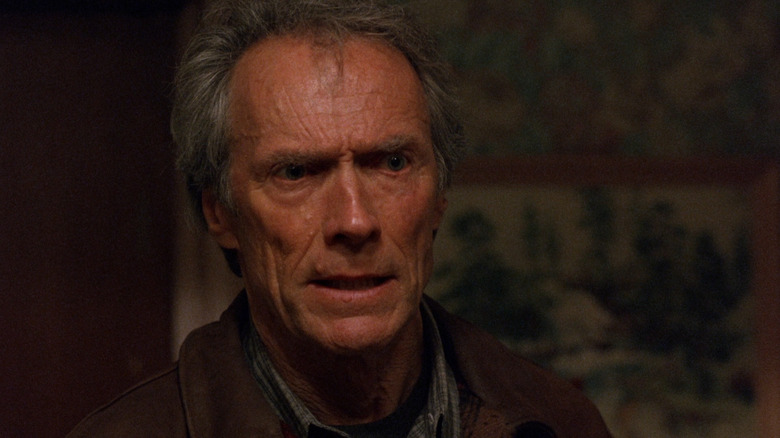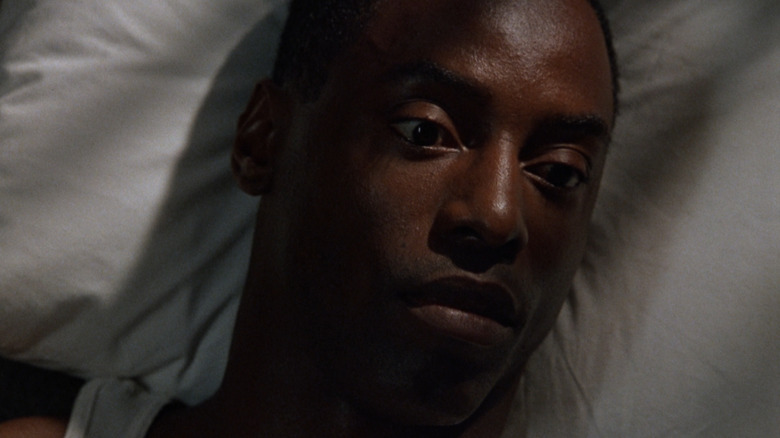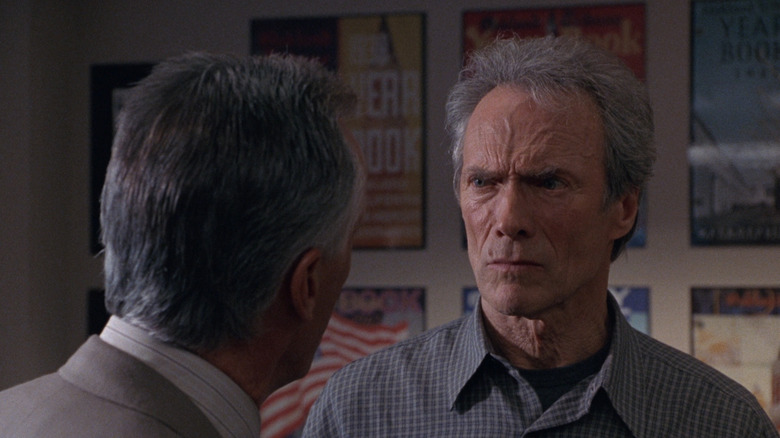One Of Clint Eastwood's Biggest Box Office Flops Is An Underrated Mystery Gem
Robert Altman's "The Player" is one of the greatest movies ever made about movies, and it has one killer scene that just about sums up Hollywood in the 1990s: A script condemning capital punishment goes from an earnest indie project with no big names involved to a major starring vehicle for Julia Roberts, whose character is saved from the gas chamber at the very last moment by a figured played by Bruce Willis. Released in 1992, you'd think that mainstream studios would dispense with such cornball endings after that skewering, but they kept on using the death penalty as a dramatic hook right up to the end of the decade, from tear-jerkers like "Dead Man Walking" and "The Green Mile" to glossy legal thrillers such as "Primal Fear" and the Samuel L. Jackson-starring would-be Oscar contender "A Time to Kill." Even Clint Eastwood got in on the action with "True Crime," one of his biggest flops as an actor and director.
Eastwood has been directing himself since "Play Misty For Me" in 1971, and his movies generally tend to make a decent profit, though he has had a few duds along the way. "White Hunter Black Heart," "The Rookie," "Blood Work," and "Cry Macho" all disappointed at the box office, but none lost quite as much money as his 1999 adaptation of Andrew Klavan's airport novel. It only made $16 million against a $55 million budget, which must have come as quite a shock in a reliably profitable genre, especially coming from an Oscar-winning director and a stacked cast; aside from Eastwood himself, the film's ensemble also includes Isaiah Washington, LisaGay Hamilton, James Woods, Denis Leary, Bernard Hill, Michael McKean, and several other dependable supporting actors. Maybe it was down to the generic title or a routine trailer that hits all the familiar beats and shows pretty much the whole film. Or perhaps it was because audiences were starting to tire of the hackneyed old death row dash, and it looked a bit old hat coming out a few weeks before a groundbreaking new movie called "The Matrix." Whatever the reason for its commercial failure at the time, "True Crime" is an underrated mystery gem that still deserves another chance. Let's take a closer look.
What happens in True Crime?
Frank Beechum (Isaiah Washington) is a San Quentin inmate just hours away from execution by lethal injection. Six years earlier, he was convicted for the murder of a pregnant convenience store clerk who owed him money. It seems like an open-and-shut case; one witness saw him fleeing the scene covered in blood, while another claimed to see him standing over the body with a gun in his hand.
Michelle Ziegler (Mary McCormack), a young reporter for the Oakland Tribune, is assigned to write a "human interest" story and conduct a final interview with the condemned man. However, when Michelle dies in a car wreck, the newspaper's stuffy editor Bob Findley (Denis Leary) begrudgingly hands the task to Steve Everett (Clint Eastwood), a grizzled old-school reporter who is sleeping with his wife.
Everett is a bit of a mess. He's a recovering alcoholic and a serial womanizer, his marriage is on the rocks, and he's a terrible dad to his cute little daughter. His past is even more troubling; he was once on track for a Pulitzer Prize before he was blackballed for sleeping with his previous boss's underage daughter, and his credibility is low after he tried to clear a guilty sex offender the year before. But his cynical editor-in-chief (James Woods) still has some faith in Everett's nose for a story and gives him 12 hours to investigate before Beechum meets his fate.
In typical fashion for this kind of movie, Everett immediately sniffs out flaws in the case against Beechum that nobody was able to spot before. With the clock ticking, "True Crime" becomes a race against time as Everett re-interviews witnesses and tries to uncover evidence that will save a wrongly convicted man's life, all while juggling static from his work colleagues and problems at home. The outcome will surprise precisely no-one in a finale that seems directly inspired by the spoof nail-biter in "The Player," but Eastwood's approach to the material makes the movie more interesting than many other standard potboilers of the '90s.
True Crime is a flawed but interesting movie
Clint Eastwood is an intelligent director whose measured approach to filmmaking is matched by his laconic acting style, which, at first glance, makes him a strange fit for a routine '90s race-against-the-clock thriller like "True Crime." But Eastwood has always been interested in his own mythos, and the film came along as he was trying out variations of his screen persona in a series of best-seller adaptations, among them "The Bridges of Madison County" and "Absolute Power." As such, the generic nature of the mystery at hand serves as a backdrop for another of Eastwood's studies into rugged masculinity.
"True Crime" has an unusual structure, with two stories running parallel. One is a quiet and methodical look at Frank Beechum's last day, focusing on the procedures ahead of the execution, a heart-rending visit from the prisoner's wife and young daughter, and interactions with Bernard Hill's unusually kind prison warden and Michael McKean's sanctimonious priest. The other side of the film dives into Steve Everett's chaotic life, and it's a fascinating mess as Eastwood allows the plot to wander off on tangents.
Everett feels like a character written for a younger man than Eastwood, who was in his late sixties when he played the role. We're asked to believe that he is irresistible to just about every woman in the Bay Area, which means we get the ick factor common to other films where Eastwood portrays a lothario (see also: "The Eiger Sanction"). The movie also grinds to a halt for some ripe locker room talk between Everett and his editors, which is pretty cringe thanks to Eastwood's usual tin ear for comic dialogue. Between all the banter, flirting, and an amusing scene where Everett gives his daughter a whistle-stop tour of a zoo, it's a wonder he gets around to looking into the case at all.
Everett may have made for a more believable character with a younger actor playing him as the scumbag he is rather than Eastwood's ornery rascal, but the star embraces the character's faults. This ultimately works in the movie's favor as it draws a comparison between Beechum and Everett, himself a dignified family man relying on a neglectful husband and father to save his life. Their sole meeting is a dramatic highlight, and it all pays dividends when "True Crime" suddenly shifts into top gear for a preposterous yet gripping finale.


